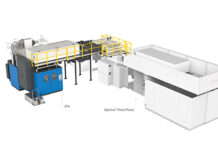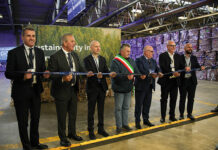Last November Giflex renewed the Executive Committee which elected Alberto Palaveri as new president called to lead the association from 2021 to 2023 towards important and stimulating challenges.
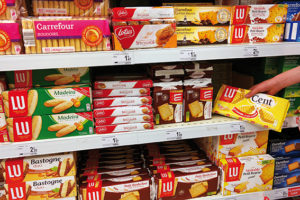
For Giflex, the association of flexible packaging manufacturers, autumn is traditionally a time to meet, discuss the trend of the sector and trace important future scenarios for companies that have to make strategic decisions. An appointment that last November 11 was confirmed with a very participatory live stream opened by a connection with Gianni Girotto, president of the X Industry Commission of the Senate, because if an action is to be carried out by the association, especially in quite periods troubled, like the one we are experiencing, is exactly a lobbying activity against politics. “We need to focus on innovation to improve and facilitate the transition to a sustainable model with recyclable and biodegradable products. Italy must maintain a technological leadership that already exists but must be developed further. Among the important actions to be carried out there will be the definition of the border carbon tax: a tax calculated on the CO2 content of goods imported into Europe, therefore a sort of environmental duty, which would weigh on products and raw materials from countries where there are in force weaker anti-pollution standards compared to European ones. The basic principle is that those who pollute the most have to pay the most. “This tax is used to internalize the negative externalities of products arriving in Europe from anywhere else in the world, which is necessary because we must safeguard the competitiveness of European companies compared to the rest of the world and we can no longer afford the luxury of not charging for extra-Europa environmental damage that eventually arrive because the supply chain is global, says Girotto.
 It is essential to support innovation and technological research, essential for evolution, and the aid could also come from purposeful taxation, which would be a good idea to have funds that can be reinvested precisely in research, and as the outgoing president Michele Guala specified, in our country there is still a lot to do in these areas.
It is essential to support innovation and technological research, essential for evolution, and the aid could also come from purposeful taxation, which would be a good idea to have funds that can be reinvested precisely in research, and as the outgoing president Michele Guala specified, in our country there is still a lot to do in these areas.
As always, the conference has placed at the center of the debate topics of very topical relevance, from sustainable growth to tax regulations in support of the growth of companies with valuable and useful advice to entrepreneurs by the tax director of the Ministry of Economy and Finance Lelio Cacciapaglia, up to the new organizational paradigm imposed by the disruptive advent of smart-working.
Face to face with Alberto Palaveri, the new president of Giflex
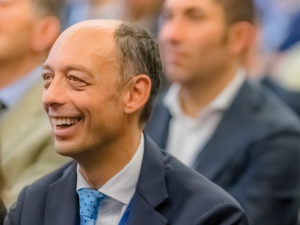
Elected last November 24 by the new Executive Committee, Alberto Palaveri will have the burden and the honor of leading Giflex in the three-year period 2021-2023. A very active figure in the association, where he held the position of vice president, Palaveri is the CEO of Sacchital, a leading company in the production of flexible packaging with a consolidated turnover of € 110 million and a protagonist together with other leading companies in the sector with the launch of solutions of recyclable and compostable high barrier packaging.
Dr. Palaveri, what will be the characterizing points of your mandate?
“We will continue the relationship with the institutions that most of all affect our sector with their decisions, namely Parliament, Government and why not also the European Community. Lobbying is essential to support the demands of a strategic sector such as flexible packaging. It becomes essential to explain who we are, what we do, and the contribution we can make so that political decisions pursue the common good. We are happy that there is a lot of attention on the packaging, but we want it to be useful to improve the quality of our products and the service rendered to the community. There is a need for shared working tables. When we shop in a supermarket, one product out of two purchased is packaged in flexible packaging, therefore we have an important role and responsibility towards consumers, and from this point of view we will have to have a greater impact on the communication aspect at national media level, counting on the support of all associated companies, from the largest and most structured to the smallest. Giflex will have to become more and more a point of reference, a listening center for all instances, only in this way we can grow well together.
Can we say that Covid-19 has in fact revived the importance and role of packaging in public opinion?

“Covid has brought us back to the essentials, therefore packaging has been appreciated for its primary function, which is to store and transport food in our homes. Packaging has assumed great social value, even if for years the emphasis has been placed only on the negative effects it creates on the environment. In the future I am convinced that the two souls will coexist, therefore taking for granted the positive values that packaging brings to our lives, we will always have to face, rightly, issues related to sustainability. This will make the challenge of the operators in the sector even more fascinating”.
How the economic crisis due to Covid has changed and is changing the choices of consumers and end users regarding packaging?
“The packaging sector in the last year has been the protagonist of a strong volatility, with incredible peaks of growth month on month. To intercept the new needs it will be fundamental, both at associative level – but also and above all within companies – to increasingly leverage young people and women, who I believe are a very important resource for growth, and open up to the contamination of ideas, cultures, different ways of thinking, without forgetting the experience of those who have worked in the company for years. Young people are used to strengthen companies and listen to the issues of the future. Another fundamental theme is that of design, since in a supply chain characterized by great uncertainty but also a lot of innovation, converters will see their responsibilities increase, taking on a role of primary importance in the structural design processes of the packages that we will print and convert. Today brand owners rely more and more frequently on converter companies to structurally design packaging, and in this phase it is also necessary to evaluate the whole issue of end of life, sustainability and recycling, in which Giflex can also play a fundamental role of connection with the various institutions and bodies in charge. Knowing today how the separate collection system technically evolves is essential for designing packaging that can then be correctly managed in recovery and recycling operations. Today, with the power of social networks, end consumers play an increasingly active role in communication: they write reviews, underline problems and the sounding board is enormous”.
You come from a company that has become the protagonist of collaborative projects in favor of the market. Can you tell us about it?
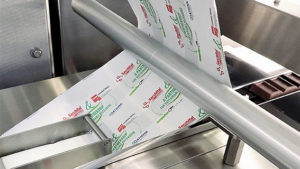 “In Sacchital we strongly believe in innovation, and having mainly foreign market shares, when we decided to want to grow also in the domestic market, in order to be more attractive we had inevitably to differentiate ourselves, aiming for innovation and involving other players in our project, our raw material suppliers upstream, while downstream the manufacturers of packaging machines. Openness and the ability to collaborate are fundamental in a global, complex market, where it is useless to shut oneself up in defense. If we talk about packaging of the future and we want to win challenges, this is the way to go”.
“In Sacchital we strongly believe in innovation, and having mainly foreign market shares, when we decided to want to grow also in the domestic market, in order to be more attractive we had inevitably to differentiate ourselves, aiming for innovation and involving other players in our project, our raw material suppliers upstream, while downstream the manufacturers of packaging machines. Openness and the ability to collaborate are fundamental in a global, complex market, where it is useless to shut oneself up in defense. If we talk about packaging of the future and we want to win challenges, this is the way to go”.
What Giflex could do to encourage dialogue between the realities interested in collaborating to react in an innovative way to the crisis?
“Training, promoting the culture of packaging, and inviting companies to open up, exactly as open associations should be. In Confindustria we need to think more at a systemic level, joining forces with the supply chain associations of the other sectors, because many common problems, if faced together, will have more strength towards the institutions. Associations must think about the medium-long term, they have no budget to respect, and this means, both nationally and internationally, being able to dialogue with everyone. For this reason I am happy that past president of Giflex Michele Guala will continue to collaborate with the association and will have an international role, I would almost say “Giflex foreign minister” to carry out common requests also at European level, as evidence that you have to work as a team and everyone is needed to overcome the complexity of the challenges we will have to face in the coming years”.








